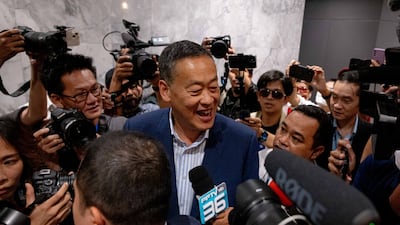Property mogul Srettha Thavisin on Tuesday became Thailand's new Prime Minister after receiving the backing of parliament, paving the way for a new coalition government and ending weeks of political stalemate.
Mr Srettha, who was thrust into the spotlight only months ago by the populist Pheu Thai party, gained the support of more than half of the legislature, on a day when the party's billionaire figurehead Thaksin Shinawatra made a historic homecoming after years as a fugitive in self-imposed exile.
The remit of political neophyte Mr Srettha, a former president of property developer Sansiri SIRI.BK, will involve forming and holding together a potentially fragile coalition comprising parties backed by the royalist military, which overthrew Pheu Thai governments in coups in 2006 and 2014.
Thaksin, 74, received a rapturous reception on his return from supporters at Don Mueang International Airport in Bangkok, before being escorted by police to the Supreme Court then to jail to serve a sentence of eight years.

The return of Thailand's most famous politician and Mr Srettha's smooth ascent to the top job will add to speculation that Thaksin may have done a deal with his enemies in the military and establishment to allow for his safe return, and possibly an early release from jail.
Thaksin and Pheu Thai have denied such claims.
Pheu Thai is the latest in a string of parties formed Mr Thaksin or his allies, two of which were removed from power in military coups, resulting in years of upheaval and division that pitted a mostly poor, rural pro-Thaksin majority in the north against royalists, the military and their urban backers.
The former prime minister says his return has nothing to do with Pheu Thai’s bid for power but many believe the party made deals with pro-military parties to set up the 74-year-old billionaire’s return.
Thaksin's private jet landed about 9am local time in Bangkok, where he was welcomed by family and supporters.
Hundreds of his supporters gathered outside the airport hours ahead of his arrival, donning red, a colour long associated with Thaksin, and holding signs with welcoming messages. They showed their devotion to him with songs and chants, then raised raucous cheers when he appeared at the entrance.
“I feel fulfilled that I travelled here today to pick him up. If possible I want to hug him. Everyone has tears, tears coming out of their eyes,” said Makawan Payakkae, 43, from Maha Sarakham province.
Decades ago, Thaksin promoted populist policies and used his telecoms fortune to create his own Thai Rak Thai party.
He was elected prime minister in 2001 and easily re-elected in 2005, before being ousted in a military coup in 2006 and fleeing into exile a few years later.
Mr Thaksin was tried in absentia on corruption charges he dismissed as politically motivated, and sentenced to eight years in prison.
On Tuesday, his convoy went from the airport to the Supreme Court, where a body that handles criminal cases against former officeholders confirmed the sentence. He then left the court and went to Bangkok’s main prison.

Correctional officers at Bangkok Remand Prison said that following a medical check, Thaksin had been categorised as “vulnerable” due to his age and chronic conditions affecting his heart and lungs, including high blood pressure.
It isn’t yet clear how much of his prison sentence Thaksin will actually serve. Officials have said he, like other inmates, can apply for a royal pardon from day one.
His daughter Paetongtarn Shinawatra, a key figure in Pheu Thai, posted family photos with Thaksin in the middle on Facebook with a message thanking supporters who welcomed her father at the airport, saying “me and my family are very grateful.”
Less than a week before May elections, Mr Thaksin announced he would like to return before his birthday in July, but the plan was repeatedly delayed, with he and Ms Paetongtarn citing post-election uncertainties and his health.
Pheu Thai came second in the elections but took over leadership in forming a new government after the surprise winner, the progressive Move Forward party, was repeatedly rejected by conservative senators appointed by a previous military government.
Pheu Thai has been heavily criticised by some supporters for backtracking on a pre-election pledge not to join hands with pro-military parties. Party officials have defended the decision by saying it was necessary to break the political deadlock and seek reconciliation after decades of deep political divisions.
Thaksin was ousted while he was abroad in 2006. He came back briefly to Thailand in 2008 to face a court trial before fleeing the country. He has avoided returning over concerns he would not be treated fairly by the military-backed government and establishment that has long held a sharp animosity towards him.
“Thaksin’s plans to return to Thailand were postponed after the election results were announced – this implies a strong connection between the election, formation of coalitions, and selection of the prime minister on one hand, and Thaksin’s personal agenda on the other,” said Napon Jatusripitak, a political science researcher and visiting fellow at Singapore’s ISEAS-Yusof Ishak Institute.
“Thaksin has managed to make this election about himself personally, and the direction of a Pheu Thai-led coalition heavily depends on his personal whims,” he added.

